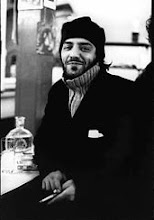Though Thoroughbred Racing has lost its mainstream appeal, it still has a strong, almost cultish fanbase- and I think that's because it truly epitomizes Mr. Moore's "microcosm theory."
Take for instance the 1993 Breeders Cup Mile. Lure drew the number 14 post position and many thought that it would be his downfall. Turf racing is all about saving ground and it would take a special horse to go wide around turns and still win. However, Lure did just that. He wound up darting from the outside to the rail and he still had enough left to run past Ski Paradise and post a comfortable victory.
In fact, I've seen so many horses win from terrible post positions that a novice racing fan might think that the disadvantage of an outside post is not as bad as those of us who've been around the game make it seem. However, a bad post position affects your entire strategy and can cause a horse to have to cover an extra two to three hundred feet of ground. So, how is it that so many horses overcome this huge bias? The simple answer is that some horses just will themselves to win regardless of the circumstances. Anyone who saw the 2008 Kentucky Derby knows that Big Brown had to summon something incredible to win that race. He then had to summon that incredible something tenfold in order to win the Haskell that same year. The point I'm trying to make is that thoroughbred racing is hardly an egalitarian sport, yet so often the best horse seems to find a way to win.
Now how does this all relate to life?
Several days ago I was having dinner with my friend Russell. Every group has one guy who always has an interesting story to tell, and he's ours. So naturally, he pursued the one avenue of life most promising for those that always have a story to tell- he became a comedy writer. His career has been going well, and a month prior to our dinner I saw him do a hilarious set at Comix in New York City. However, when we sat down for dinner he seemed slightly frustrated. I can't completely remember how long it took me, but when I finally got him to open up he told me that his career wasn't progressing as quickly as he would've liked it to because he hadn't gone to an Ivy-League school like many other comedy writers.
I tried hard not to chuckle. I couldn't believe he was using his alma-mater as an excuse. Though it is true that going to an Ivy-League school opens many doors in the entertainment industry, people from all types of universities make it, because like thoroughbred racing, talent wins out. My favorite pop-culture writer Chuck Klosterman went to the University of North Dakota. Surely, going to Columbia would've been more beneficial for an aspiring pop-culture journalist, but Chuck made it anyway. In fact, the offices of top magazines are filled with people who did not attend a prestigious college.
Several years ago economists found that people who go to second-tier universities but possessed the credentials and gained acceptance into top-tier schools are just as well off in the long run. I would agree that going to a school that no one has ever heard of may be like breaking from the 20th post in the Derby, but those who are truly talented often make it anyway- just ask Big Brown.

No comments:
Post a Comment